- Home
- Roberto Saviano
Savage Kiss Page 33
Savage Kiss Read online
Page 33
Drone slumped down as if struck by a lightning bolt and the paranza surrounded him, in a tortoise formation, turning their backs to their enemies. Nicolas yanked off his ski mask, and Lollipop and Orso Ted followed suit. Drone, too, on the ground, yanked off his and waited for the three above him to paint him with the blood from their injuries.
“You don’t have AIDS, do you?” Drone muttered through clenched teeth.
“Shut up!” said Nicolas, snapping a photo of him. “Right now, you need to be dead!” And then, turning again toward the Roma fans: “He’s dead! He’s dead!”
The fans reversed course, retreating, while others started running in the opposite direction, finding their way blocked by the police. The word dead had lit the fuse to a panic, as if the mere fact of being anywhere around a dead body somehow brought with it an element of guilt.
In the meantime, Lollipop had grabbed Drone by the arms and was dragging him away, still surrounded by the members of the paranza, who were shouting, “Murderers! He’s dead! They killed him!”
“Deader, look deader,” Lollipop was telling Drone, “relax your thighs! Your head, let your head loll to one side!”
As the police sensed the shift in the wind, they started halting Roma fans to search them.
Drone rose from the dead behind another tour bus, but by then the mayhem was so all-encompassing that even a group of snickering kids with bruised and swollen faces could pass unnoticed.
* * *
“I saw him! He’s dead! He’s dead!” Nicolas was pushing his way through the Naples fans clustered on the curve, brandishing his smartphone as he moved forward. He held the phone high, like mothers at the funerals of their kamikaze children, suicide bombers who’d immolated themselves for the glory of Allah, and at first his audience would take a quick glance, and then lock ranks until they finally recognized Maraja and let him through. The match had started only a few minutes earlier. Nicolas followed the route that the fans, as they stepped aside, involuntarily blazed for him toward the leader of the ultras, the Naples hooligans: ’o Mammuth. Six foot seven, two hundred sixty-five pounds, covered with a dense coat of fur that only opened out into clearings where there was a tattoo—such as the acronym that he’d had inked onto his youthful back: ACAB. All Cops Are Bastards. Whenever he was on the curve, rain or shine, ’o Mammuth never wore a T-shirt, and anyone who wanted to talk to him had to do so in the unblinking presence of those unfettered double-D cups. He’d become the chief due to valor on the field of battle, and he commanded the curve by virtue of a pair of arms the size of tree trunks. Tattooed on his right arm was the word good and on the left arm was bad, and he used them on the basis of what instinct and experience had taught him.
“He’s dead, he’s dead! The romanisti killed him,” Nicolas went on repeating.
’O Mammuth waited for him at the mouth of the tunnel to ask him one simple question: “Who killed him, the cops or the romanisti?”
“The ultras! The ultras! I saw it with my own eyes. Look! They killed him!”
’O Mammuth held the smartphone up close to his face. He carefully studied the photo of Drone covered with blood, and then he gave Nicolas back his phone. He crossed his arms over his head. He’d made up his mind: the match had to be canceled.
On the pitch, the teams had stopped play because from outside word was arriving, in muddled form, of clashes between militant groups of fans, and there was even talk of a death. ’O Mammuth went over to the edge of the bleachers to repeat that signal, arms crossed over his head. In the meantime, a delegation from the home team had broken away from the knot of people at the center of the field and was heading toward the bleachers where the ultras were concentrated. Escorted by the police, the captain of Napoli went over to ’o Mammuth.
“If there’s been a death, we’d be the first to stop play,” he said, his voice cracking slightly, betraying his underlying concern.
“There’s been one,” said ’o Mammuth. “We can’t continue.”
The captain clasped his hands together: “Trust me, there hasn’t been a death. The situation is well under control.”
’O Mammuth looked at Maraja, and Maraja leveled a pointed finger at the soccer player: “We’ll let you play out the match, but if things aren’t the way you claim, I’ll come and get you.”
The captain pretended to be pleased, thanked Maraja and ’o Mammuth, and headed back to the pitch at a run. The match could resume.
Napoli won a narrow victory, thanks in part to the ultras in the curve who loudly rooted for their team, singing fight songs without a break for the whole ninety minutes plus injury time. A victory like any other, nothing special, and yet that didn’t keep the fans from swarming onto the field to celebrate and perhaps also to work off the adrenaline they’d accumulated in that tense and frenzied pregame buildup. And while the players surrendered their sweaty jerseys to the feverish fans, the police took advantage of the opportunity to burst into the bleachers. Weapons, narcotics, dozens of illegal skyrockets: it had been some time since there’d been such a radical law enforcement operation in the curve of the stadium, where the hard-core fans congregated.
“Ua’, we fucked him good,” shouted the members of the paranza, leaping up and down on the soccer field where Micione would soon lose his contracts and subcontracts. “We scalped him.”
It was a night straight out of the Champions League, with fireworks and processions of cars in the street, a carnival feeding on its own bonfire of euphoria, and when everyone went to bed, wrecked, overjoyed, pumped up with a lust for life, there was only one man weeping, and it wasn’t for joy. One of the team officials had barricaded himself in his office, and seemed unable to do anything but repeat, over and over, “What fucking idiots we look like now.” He’d tried to turn on the radio but the voices of the fans just made him want to throw up.
It had been a disaster. The police, the fighting, the confiscations, the conversation between the team captain and that oversized gorilla ’o Mammuth broadcast on a national network. Heads were going to roll, that much was certain, and most likely his would be one of them. But first he was going to make sure that one in particular fell, if he had to saw it off himself.
* * *
For the sports team executive, the itinerary that led to the penthouse apartment in San Giovanni a Teduccio was no mystery, and in fact he was one of the privileged few who could ring that doorbell unannounced. After all, he was one of Diego Faella’s most important business partners. The neighborhood that morning was virtually wallpapered with death announcements. It was with regret and grief that the untimely death of their trusted, courageous, caring friend Genghis Khan was announced: the whole family was shaken by this loss. The man entered the elevator in a raging fury; he felt betrayed, defrauded of the trust that he’d placed in that fat tub of lard, and now he was screwed because the man hadn’t been able to hold at bay a handful of snot-nosed kids.
He found Micione in the kitchen. Perched precariously on a stool, he was picking at cold french fries out of McDonald’s cardboard packaging. It was clear that he’d just stopped crying, and he was doing nothing to conceal the fact.
“All hell has broken loose!” the executive began. He heard Viola and the Filipina housekeeper go by in the hallway. The mistress of the house was giving the woman instructions, but in an undertone. The situation must be pretty serious, thought the executive.
“Yeah, I saw,” Micione replied. “What are you thinking of taking away from me?” And he grabbed a handful of french fries.
“I’m probably about to get fired. Now you need to pay me. I’ve got a mortgage on my apartment in Posillipo, an ex-wife, alimony to take care of. This year we can get the Champions League.”
Micione crushed the ketchup packets that he’d set aside because the sickly sweet chemical concoction turned his stomach. Under his powerful fist, a bloodred lake began to spread. “Enough with this orchestra of yacking. I’m not in the mood for it: just tell me what you’re planning to take aw
ay from me!”
“All right,” said the executive, “grounds maintenance, parking facilities, bars and cafés, jerseys and T-shirts.”
“Fuck me, everything,” said Micione. He tried to wipe off his hand with one of the McDonald’s paper napkins, but with that flimsy piece of paper it would take him a lifetime, so he just forgot about it.
“You can just thank me if we’re taking away those contracts to punish you, because you failed to ensure security and safety in the curves. I’m just taking away the things that aren’t under my control. The parallel market, you can keep handling that on your own,” the executive said, in a gesture of generosity.
Micione got off the stool and went over to the sink. He let the water run for a while, and then he washed his face.
“So now you’ve taken these things away from me,” he said, turning around. He looked horrible, having spent a sleepless night and cried himself sick, and now his grief and misery were visibly veering toward rage. “So now what if I decide to take something away from you?”
“There’s a good chance I’m about to be ruined,” said the executive, but the arrogance he’d displayed a few minutes earlier had disappeared, and now he was modulating his voice in an attempt to stir pity in the other man. “The carabinieri are going to come to my house. I’m responsible for team logistics, I vouched for you with the ownership. I’d guaranteed that you were a reliable person…”
“If anything, it strikes me that you need to thank me”—and now Micione was looming dangerously close—“because what you’ve done up till now, you did because I was letting you. I let you skim off the top on every contract. So now if I get a wild urge, I’ll just take something away from you,” he said again.
The other man worked up the courage to ask: “Like what?”
“What do you mean, like what? Like your life. Do I still need to explain to you that if you’re still breathing today, it’s thanks to me? Every contract that you’ve won, if I hadn’t been there as the subcontractor, you never would have been able to handle it.”
The executive walked backward until he bumped against the kitchen door; he was shaking his head, as if to say no, there was no reason to go that far, and anyway, things were okay now. At last, before stepping out into the hallway and turning to go, he added: “And anyway, it’s just a temporary thing…”
While the executive and Micione had been discussing the fate of San Paolo Stadium, Nicolas and ’o Mammuth were sitting at plastic tables next to one of the bosses of San Giovanni’s food trucks right outside the stadium. They were staring in silence at the detritus of bottles, glasses, cans, and garbage of all kinds, as well as clothing, shoes, backpacks, the occasional condom, banners, hats, and even a doll.
Since the sun had risen, an hour before, they’d downed three beers, all without speaking a word. At last, ’o Mammuth spoke: “How are we going to handle things with Micione? Do you think that all this is going to bounce him out of there?”
If there was one thing Maraja had been waiting for, it was to be able to make his proposal.
“I don’t know, but I’ll give you the shit. Ten percent.”
“But they’ll shoot me.”
“Twenty percent.”
“But they’ll shoot me.”
“Thirty percent.”
“But they’ll shoot me.”
“Forty percent.”
Silence.
“If those guys decide to shoot me, will you protect me?”
Nicolas nodded. “The paranza will defend every one of your piazzas to the death. I’ll bring you the narcotics, no matter where, even to away games. We need to sell to all the friendly curves there are.”
Still more silence. Then ’o Mammuth went over to the food truck fridge. They needed more beer to toast their agreement.
BIG PARTY
On Nicolas and Letizia’s wedding day, there was only one snag, though the young groom knew nothing about it. Letizia had woken up at five in the morning to allow the hairdresser and the beautician to do their job, but her mother understood that the bride was worried about something.
“What’s wrong, my love, this is the happiest day of your life, aren’t you satisfied?”
Letizia had shooed all the other women out of the room and had told her mother, through her tears: “Ma, I’m wearing a white dress…” And she pointed to the rounded belly that the Empire-style gown was softly sheathing. Her mother had shaken her fire-red dome of blazing hair and held her daughter to her breast. “Letizia, beautiful, your mamma’s heart and soul, but is that why you’re crying?” she’d asked, her heart melting at her daughter’s concern. “The only purity that matters is what’s in your heart,” she’d explained, as she petted her darling. Letizia had smiled, dried her tears, and that was the end of it.
They got married at the church in Forcella. Nicolas had wanted “a red carpet like at the Oscars,” and hand in hand with Letizia, he walked the red carpet through a crowd of people who wanted to make that day unforgettable, with Maraja and his bride.
“Long live the newlyweds!” the paranza shouted. “Long live Maraja! Long live Letizia!”
Letizia was thrilled, and every so often Nicolas turned around to look at her, to bolster her confidence. Then the priest uttered the familiar formula of the ritual: “Nicolas, do you take Letizia to be your lawfully wedded wife, and do you promise to be true to her in good times and in bad, in sickness and in health, and to love and honor her all the days of your life?” Nicolas almost didn’t let him finish, and said: “I do, by all that I hold unholy!” unleashing the hilarity of the members of the paranza in the front rows: “Epic Nico’!”
After the ceremony, family and friends went on to the New Maharaja. The newlyweds arrived an hour later, in a silver Rolls-Royce Ghost. Oscar had arranged to cover the entire parking plaza in front of the club with red carpet, and there, gathered in a semicircle, the guests burst into thunderous applause when Nicolas—who had chosen formal attire, complete with a cutaway swallowtail frock coat and white tie—stepped out of the Rolls and went around to open the door for Letizia.
Everyone was there. The families, down to every last member, the mothers in filmy gowns, the proud fathers, the grandfathers, the friends of the paranza—some in pinstripes, others in black suits with Air Jordans on their feet. In the front row, ’o Cicognone and Aucelluzzo could be seen. Also, here and there, prominent soccer players with wives squeezed into minidresses, and rappers in tracksuits. And Professoressa Cicatello was there, too, off to one side, keeping a low profile, but overjoyed, as if Nicolas had been one of her students on graduation day. She was holding a box with handsome sky-blue giftwrapping, and Nicolas was afraid that she had decided to give him a piece of Capodimonte porcelain.
Still, there was nothing that could ruin the joy of that day, neither the grueling and mind-numbing church ceremony nor the even longer picture-taking session, least of all a damned porcelain ballerina. It was a day of celebration, meant of course to consecrate the creation of a new family, but also to commemorate his victory over Micione. The paranza reigned and prospered over the center of the city. They’d struggled and labored and now they’d succeeded. He’d succeeded. He looked at his men: Briato’, Tucano, Lollipop, Pesce Moscio, Drone. And yet, as he looked at them, he also saw the ones who were missing—Dentino, Stavodicendo, Drago’, Biscottino. He’d lost almost half of his brothers, and those losses hadn’t been pretty. Not to mention Christian.
“Aren’t we going in, sweetheart?” asked Letizia, finally at peace.
No, nothing could ruin their party. He locked arms with his wife and together they entered the New Maharaja in a shower of rose petals, without even noticing that among the waiters bowing their heads as they went by were Susamiello, Pachi, and Risvoltino. They had shown up at the club a couple of hours earlier with a group of friends, in accordance with Briato’s orders, and they hadn’t objected in the slightest as they were being issued their uniforms, in fact, quite the opposite: “Ua’, so are we
dressing up as waiters so we can infiltrate the wedding and stand guard as secret sentinels?” Susamiello had asked. Briato’ had burst out laughing, slapping him on the back in a way that accentuated the S-shape of that unripe, twisted body: “You’re dressing up as waiters so you can lay out the silverware and bring food to the table!”
The newlyweds started dancing, while the guests all took seats at the tables and the paranza sang the hook of the song that was blasting out insanely loud, at full volume.
Abbasc’addu me m’par’ GTA!
NAP’L’!
Mena was fluttering in her flowered dress from one table to another, and she even let Lollipop steer her out onto the dance floor. Every so often she’d shoot a quick glance at the corner table where the man who was still technically her husband was sitting. She thought she was going to have to argue with Nicolas to get him to invite his father, but instead he had replied unassumingly: “Already taken care of, Ma.”
It was a big party. There was laughter and tears of joy, hugs and kisses, passionate dancing and romantic dancing, hymns to a prosperous future and to goals achieved. And then, in the end, came the time for the presents.
Nicolas and Letizia took a seat on the little sofa of the private room, ready to offer their thanks for the silver sets that would be merely a prelude to the envelopes stuffed with cash.
Nicolas had seen the paranza disappear midway through that ritual, and he’d envied them their freedom. He, too, would gladly have ducked out of that boring situation, but he couldn’t. But when he saw them reappear, with Tucano and Lollipop carrying a large cardboard box, he understood that the time had come for their wedding present.
They set the box down in front of the newlyweds and he saw that it was moving as if it were alive.
“There’s no way we’re getting another dog, my love, let me tell you,” Letizia said, but Tucano reassured her: “Oh, come on, who do you take us for? We don’t give replica gifts, you know. There’s Skunk already, and she’s more than enough!”

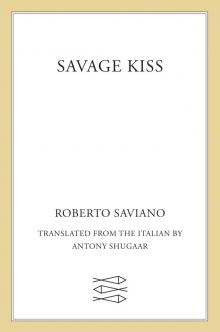 Savage Kiss
Savage Kiss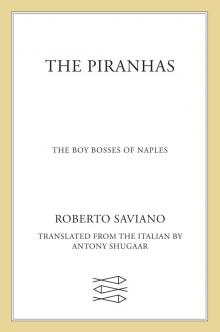 The Piranhas, The Boy Bosses of Naples
The Piranhas, The Boy Bosses of Naples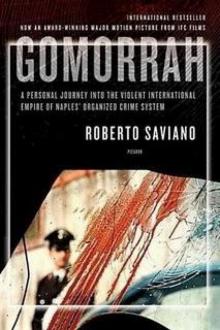 Gomorrah
Gomorrah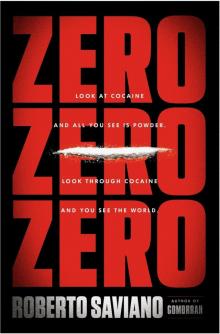 ZeroZeroZero
ZeroZeroZero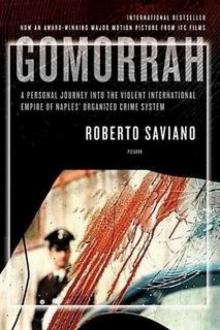 Gomorrah: A Personal Journey into the Violent International Empire of Naples’ Organized Crime System
Gomorrah: A Personal Journey into the Violent International Empire of Naples’ Organized Crime System